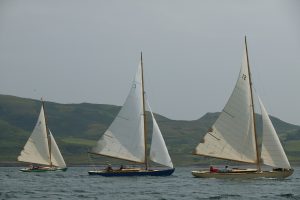Even if you don’t have sea-legs this gem of a book is awash with tales of colourful characters, extraordinary episodes and remarkable events to float your boat.

It has taken author Ewan Kennedy from Kimelford 12 years to write and is his first voyage into being a published author.
There is a lot of the West Coast in the book, with anecdotes from around Oban and Ardfern from the 1970s to the present day – including tales such as the stoned cows, due to cannabis smugglers dumping their cargo into the Sound of Mull.
Former lawyer Ewan, who has had a lifelong interest in ships and the sea, will be at The Rockfield Centre on Saturday October 28 from 3.30pm to launch his book – The Scottish Islanders, a name given to a fleet of identical sailing yachts launched in 1929.
For more than 40 years, he looked after one of these little boats, during that time he researched them and was entrusted with a great deal of personal information, including family photographs, which adds greatly to the story of how in the years before the war, they were sailed by some of Glasgow’s best known business families.
The Scottish Islanders were designed, built and organised to ensure absolutely level
competition, winning was entirely down to boat handling skills and
cunning.
Each weekend, the wealthy families would abandoned their home comforts to race against each other, regardless of the weather, sometimes the only fleet seen out on the Firth of Clyde.
Their antics excited interest far beyond the yachting fraternity and were eagerly covered in the national press.
The book is about far more than close finishes in yacht racing, using the Scottish Islanders as a thread, Ewan draws together stories about the families involved.

Udy Russell, a pioneer of women on water, is just one of the characters whose story is told. Other tales include their occasional excursions abroad, when the Scots did battle with America’s best in Oyster Bay, outside New York.
This section ends with a look at the return of the survivors post war, the book then moves on to tell a story of decline, when the yacht racing fraternity moved away from wooden boats, but the Scottish Islanders survived in the hands of people who just wanted to sail and who appreciated craftsmanship, style and seaworthiness.
There are descriptions of different approaches to restoration, some professional,
some amateur, containing tales of individual struggles and challenges.
The survival of most of the fleet has provided colourful tales of exploits and excursions, as new generations of sailors, very different from the original group, continue to discover the fun of exploring the west coast of Scotland, with the boats still winning races and always turning heads.
The paperback book is published by Scottish Yachting Archives, priced £18.99, and is available at the book launch or from shop.yachtarchive.scot